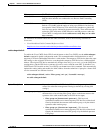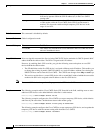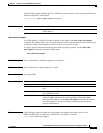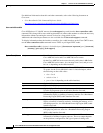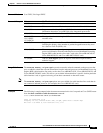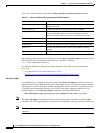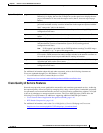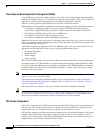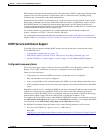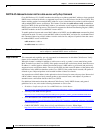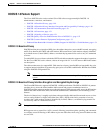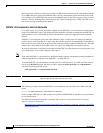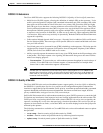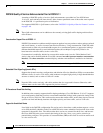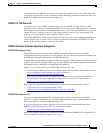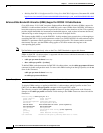
1-47
Cisco uBR7200 Series Universal Broadband Router Software Configuration Guide
OL-2239-05
Chapter1 Overview of Cisco uBR7200 Series Software
Supported Software Features for the Cisco uBR7200 Series
RTP includes a data portion and a header portion. The data portion of RTP is a thin protocol that provides
support for the real-time properties of applications, such as continuous media, including timing
reconstruction, loss detection, and content identification.
The header portion of RTP is considerably large. As shown in Figure 16, the minimal 12 bytes of the
RTP header, combined with 20 bytes of IP header (IPH) and 8 bytes of UDP header, create a 40-byte
IP/UDP/RTP header. For compressed-payload audio applications, the RTP packet typically has a
20-byte to 160-byte payload. Given the size of the IP/UDP/RTP header combinations, it is inefficient to
send the IP/UDP/RTP header without compressing it.
To avoid the unnecessary consumption of available bandwidth, the RTP header compression
feature—referred to as CRTP—is used on a link-by-link basis.
For configuration information and additional explanation, refer to the “Link Efficiency Mechanisms”
chapters of the Cisco IOS Quality of Service Solutions Configuration Guide, Release 12.2 on Cisco.com.
DHCP Servers and Feature Support
Cisco IOS software supports multiple DHCP features and server functions on the network for the
CiscouBR7200 series.
• Configurable Leasequery Server, page 1-47
• DHCP MAC Address Exclusion List for cable-source verify dhcp Command, page 1-48
• See the “DOCSIS 1.1 Feature Support” section on page1-57 for additional DHCP features.
Configurable Leasequery Server
Previously, lease query requests could only be sent to the DHCP server. Beginning with Cisco IOS
Release 12.3(17a)BC, an alternate server may be configured to receive the requests.
There are a few restrictions:
• Lease queries are sent to the DHCP server unless an alternate server is configured.
• Only one alternate server may be configured.
• Users are responsible for the synchronization of the DHCP server and configured alternate server.
• If the configured alternate server fails, lease query requests will not be diverted back to the DHCP
server.
Regardless of which server is configured (DHCP or alternate), unknown IP addresses that are found in
packets for customer premises equipment (CPE) devices that use the cable modems on the cable
interface are verified. The DHCP server or configured alternate server returns a DHCP ACK message
with the MAC address of the CPE device that has been assigned this IP address, if any.
To configure the Cisco CMTS router to send DHCP LEASEQUERY requests to an alternate server, use
the cable source-verify dhcp server ipaddress and no cable arp commands. (To configure the DHCP
server instead, use the cable source-verify dhcp and no cable arp commands.)
For additional information about this feature, refer to the following documents on Cisco.com:
• Filtering Cable DHCP Lease Queries on Cisco CMTS Routers
Beta URL:
http://lbj.cisco.com/targets/ucdit/cc/td/doc/product/software/ios122/122newft/122limit/122bc/122
bc_15/cblsrcvy.htm



